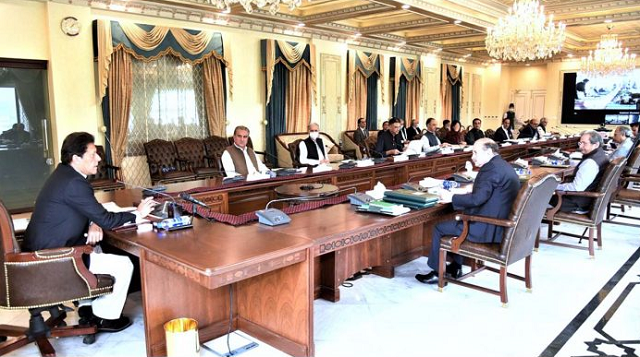
The federal cabinet, in its meeting chaired by Prime Minister Imran Khan on Tuesday, endorsed a decision to increase salaries of the federal employees and directed the provinces to decide for themselves about the salaries of their employees.
Briefing the media about the cabinet decisions, Information Minister Shibli Faraz said that the government would collect tens of billions of rupees by implementing the sugar commission report and through negotiations with the electricity companies.
The cabinet approved the appointment of Masroor Khan as the Oil and Gas Regulatory Authority (OGRA) chairman and allowed the establishment of 30 additional accountability courts in Karachi, Lahore, Multan, Peshawar, Rawalpindi, Sukkur, Hyderabad and Quetta.
The cabinet expressed concern over the release of six years old wheat by the Sindh government. “It proves two points that by not timely releasing the wheat stocks, the Sindh government disrupted the supply and gave flour to people of Sindh, particularly in Karachi, at higher prices, Faraz said.
“The Sindh government played with the lives of the people, did politics on wheat and also played in the hands of profiteers and hoarders,” he added. “We condemn this, the people of Karachi should protest on this, and the issue should be discussed in the assembly.”
The cabinet was apprised of the updates on the actions taken on the Sugar inquiry commission report. The ministers were informed that several sugar mills had approached the courts, however, action was under way after completion of court proceedings.
The cabinet was also informed that the National Accountability Bureau (NAB) was looking into the issue of subsidies. Faraz said that the Federal Investigation Agency (FIA) had unearthed money laundering worth Rs22 billion.
“Implementation of the sugar inquiry report was delayed due to court cases,” Faraz told the joint press conference with Planning Minister Asad Umar. “The government won the cases filed by the sugar mafia in different provinces,” he added.
In the past, he said, sugar prices were manipulated by the mafias. “The government is working against the mafias,” he added. “Now cameras are being installed in the sugar mills to ascertain the actual stock position.”
The cabinet ratified the decision of the finance ministry regarding increase in the salaries of the federal employees in the light of talks between the protesting federal secretariat employees and a government negotiating team, comprising Pervez Khattak and Sheikh Rashid.
Faraz said that the prime minister had again asked about the matter and the three-member committee presented its report. The committee, he said, was “in constant touch with the employees and soon a workable formula” acceptable to both sides would be thrashed out.
He added that the federal government had the mandate to deal with the federal employees, while those, who had come from provinces and where the Pakistan Tehreek-e-Insaf (PTI) or its allies had formed government, would be requested to settle their issues there.
The cabinet approved the recommendations of its committee on electricity, Faraz said. The previous regimes, he added, had signed expensive agreements with power companies and the present government could not revoke them because it would have dented the confidence of investors.
The government, he continued, held negotiations with the power companies to find ways to reduce the circular debt of more than Rs2 trillion without compromising on anything. “The new accord will save the government Rs836 billion over the next 20 years,” he said.
According to the minister, the circular debt included Rs600 billion owed to independent power producers (IPPs) and Rs700 billion to the public sector generation companies. Last year the capacity payments were of Rs650 billion but this year these were Rs850 billion due to expensive oversupply.
Faraz said the cabinet extended the period of Afghan transit agreement by three months. He also announced that the cabinet had decided to abolish the price control committees, formed in the past to determine prices of items of daily use, because those were not effective.
“In the past, the committees would focus on the prices of commodities but it could not yield the desired results, therefore, these are dissolved and now the respective [district] administrations will be responsible for price control and will be held accountable,” he added.
He said the economy and industry were suffering losses and getting less profit due to the menace of smuggling. The smuggling led to reduction in the revenues of the government and increase in indirect taxes on the public, he added.
The smuggling of petrol, he said, was inflicting a loss of Rs120 billion and was a reason for environmental degradation due to inferior petrol quality. “The customs department and the FBR [Federal Board of Revenue] are now effectively controlled the smuggling of oil,” he added.
Similarly the smuggling of cigarettes and other items would be controlled to plug the loss in revenue, the minister said, adding that the prime minister stressed that the government would have to look for alternative sources of income.
Replying to a question, Faraz said the government would not create hurdles in the way of the Pakistan Democratic Movement’s (PDM) planned long march. “It is the PDM’s legal and constitutional right to hold a protest... They are free to hold long march.”
Referring to the last sitting of the National Assembly, he said that after moving a constitutional amendment bill on open Senate vote, the government expected a debate on it and proposals from the opposition, but they created a ruckus.
He said that the PTI government wanted transparency in the Senate elections but it did not suit the opposition. “With the support of the media and the nation, the government wants to eliminate the wealth factor from politics and polls, and it is a golden opportunity to do it,” he added.
The minister urged the people not to pay heed to the non-sense propaganda by the opposition, which was claiming that the ordinance was promulgated to favour the PTI’s friends or that the PTI did not believe in loyalty of its legislators.
There were many issues, including legal ones, in the appointment of heads of public entities, Faraz said. The number of public entities had reduced from over 400 to 300-plus, while deliberations continued for their mergers. “Heads of various departments would be appointed soon,” he added.
The information minister said that the prime minister directed that the chief executive officers of about 60 public sector institutions should be appointed in a week and in case of further delay the reasons should be given.
(WITH ADDITIONAL INPUT FROM APP)
1725523665-0/Minecraft-Movie-(1)1725523665-0-405x300.webp)



1732086766-0/BeFunky-collage-(74)1732086766-0-165x106.webp)
1724268870-0/Supreme-Court-of-Pakistan-(2)1724268870-0-270x192.webp)



1732085810-0/Copy-of-Untitled-(51)1732085810-0-270x192.webp)
1732084955-0/Untitled-design-(64)1732084955-0-270x192.webp)






COMMENTS
Comments are moderated and generally will be posted if they are on-topic and not abusive.
For more information, please see our Comments FAQ